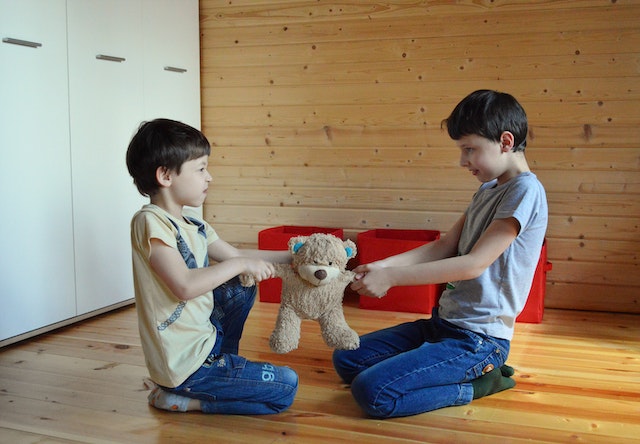Parenting is no easy feat and one of the most common struggles that parents face is their child’s misbehaviour. It can be frustrating and challenging to deal with, especially when it happens frequently.
Misbehaviours are any behavior that goes against the expected norms or rules of conduct. It can include anything from talking back, hitting, throwing tantrums, or refusing to follow instructions. The impact of misbehaviour can be significant, affecting a child’s relationships with family and peers, academic performance, and overall well-being.
Understanding the root causes of misbehaviour is crucial in addressing it effectively. It’s easy to resort to punishment or discipline as a solution, but without addressing the underlying causes, the misbehaviour is likely to persist. By delving deeper into what’s causing the child’s misbehaviour, parents can better address it in a way that promotes positive behavior and strengthens the parent-child relationship.
Common Causes of Child’s Misbehaviour
Misbehavior in children is a common challenge that parents face, and it can be caused by a variety of factors. Understanding the root cause of the misbehavior is important in order to address it effectively. Here are some common causes of misbehavior:
1. Lack of attention and connection
Children may act out when they feel neglected or ignored. For example, a child who is not getting enough attention from their parents may misbehave to get their attention.
2. Emotions and stress
Children may also misbehave as a result of emotional turmoil or stress. For instance, a child who is dealing with anxiety or stress may act out by being aggressive or having tantrums.
3. Developmental stage and changes
Misbehavior can also be a result of a child’s developmental stage or changes in their life. For example, a toddler who is learning to assert their independence may disobey their parents, while a teenager who is going through puberty may struggle with mood swings and rebellious behavior.
4. Physical and health issues
Sometimes misbehavior can be a sign of physical or health issues. For instance, a child who is struggling with ADHD or a learning disability may have difficulty focusing in class and may act out as a result.
5. Environmental factors
Children’s behavior can also be influenced by their environment. For example, a child who is exposed to violence or other negative influences may act out as a result.
Identifying the Root Cause of Misbehaviour
As parents, it’s our responsibility to identify the root cause of our children’s misbehavior. By understanding what’s behind their actions, we can address the problem effectively and help our children grow emotionally and behaviorally. Here are some ways to identify the root cause of child’s misbehaviours.
1. Observing behavior patterns and triggers
Take note of your child’s behavior patterns and the circumstances surrounding their misbehaviour. This can help you identify patterns and triggers that may be contributing to the problem. For example, does your child act out when they’re hungry or tired? Do they misbehave when they’re in a new environment or around certain people? By observing these patterns and triggers, you can address the underlying issues and prevent future misbehaviour.
Recommended reading: Do You Get Triggered By Your Kids?
2. Active listening and communication
Often, misbehavior is a result of underlying emotions or unmet needs. By actively listening to your child and communicating with them, you can better understand what’s going on beneath the surface. Encourage your child to express their feelings and concerns, and try to validate their emotions. For example, if your child is acting out because they feel neglected, you could say something like, “I understand that you’re feeling upset. Let’s spend some time together so we can connect.” By addressing the underlying emotions, you can help your child feel heard and supported.
3. Seeking professional help if needed
If your child’s misbehaviour persists despite your best efforts, it may be time to seek professional help. A counselor or therapist can help you and your child work through underlying issues and develop strategies to address the problem. For example, if your child is struggling with anxiety, a therapist can teach them coping skills and help them manage their emotions.
4. Being open to feedback and self-reflection
Finally, it’s important to be open to feedback and self-reflection as a parent. Sometimes, our own behaviors and attitudes can contribute to our children’s misbehaviour. By reflecting on our own actions and being open to feedback from others, we can improve our parenting and help our children thrive. For example, if you realize that your own stress and anxiety is contributing to your child’s misbehaviour, you could try practicing mindfulness or seeking support from a therapist.
Strategies to Address the Root Cause of Misbehaviour
1.Meeting emotional needs
Children often act out when they are feeling neglected, unimportant, or insecure. As a parent, it’s important to understand and address these emotional needs. Spend quality time with your child, actively listen to their concerns, and offer empathy and validation. Show them that you are there for them and that they are loved and valued. For example, if your child is feeling anxious or stressed about school, take the time to talk through their concerns and offer practical solutions to help them feel more confident.
2. Providing positive attention and connection
Many times, children misbehave to gain attention or to get a reaction from their parents. To prevent negative attention-seeking behavior, offer positive attention and connection. Praise and acknowledge your child’s efforts and achievements, show interest in their hobbies and activities, and be present and engaged when spending time with them. By doing this, your child will feel valued and appreciated, and will be less likely to act out for attention. For example, if your child is proud of a school project, take the time to listen to them talk about it and show genuine interest.
3. Teaching coping and problem-solving skills
Misbehavior can also stem from a child’s inability to cope with difficult situations or to problem-solve effectively. Teach your child healthy coping mechanisms, such as deep breathing or meditation, to help them regulate their emotions. Encourage problem-solving by asking open-ended questions, offering guidance, and allowing your child to come up with solutions on their own. For example, if your child is upset about a conflict with a friend, help them work through the situation by asking questions such as, “How do you think your friend is feeling?” or “What could you do to make things better?”
Recommended reading: 10 Effective Ways To Teach Your Child Problem Solving Skills
4. Creating a supportive and structured environment
A chaotic or disorganized environment can also contribute to misbehavior. Establish a routine and clear expectations for your child’s behavior, and create a supportive and structured home environment. Provide opportunities for your child to be involved in decision-making and offer them choices within limits. For example, establish a consistent bedtime routine and offer your child choices for what book to read or what pajamas to wear.
5. Encouraging positive behaviors and reinforcing boundaries
Finally, it’s important to encourage positive behaviors and reinforce boundaries. Praise your child when they exhibit positive behavior and make sure to consistently enforce consequences for negative behavior. Use positive reinforcement, such as sticker charts or verbal praise, to encourage your child to make good choices. For example, if your child follows through on a task without being reminded, praise them for being responsible and proactive.
Conclusion: What’s Hiding Behind Your Child’s Misbehaviour
In conclusion, understanding the root causes of misbehavior is crucial for effective parenting. By identifying the underlying issues, parents can address the problem at its source and help their children develop the necessary skills to manage their behavior in a positive way. Whether it’s meeting emotional needs, providing positive attention, teaching problem-solving skills, or creating a supportive environment, there are various strategies parents can use to address misbehavior.
Remember that every child is unique, and what works for one child may not work for another. As parents, it’s essential to be patient, open-minded, and willing to adapt your approach as needed. With time, effort, and the right tools, parents can help their children thrive and become well-behaved, confident individuals. So let’s start today by looking beyond the surface behavior and focusing on what’s really hiding behind it.

 Growth Mindset Workshop
Growth Mindset Workshop 


